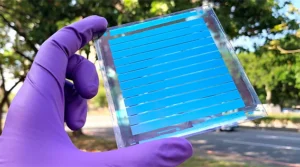Flexible, Radiation-Resistant Organic Solar Cells Show Promise for Space Exploration

Organic solar cells are gaining attention as a viable power source for space missions due to their lightweight, flexible, and radiation-resistant properties. Unlike traditional silicon and gallium arsenide cells—known for their effectiveness but also their high cost, weight, and rigidity—organic solar cells offer a more adaptable alternative. Notably, they exhibit strong resistance to high-energy protons, among the most damaging particles in space.
Radiation Resistance and Durability
A study published in Joule found that organic solar cells made from small molecules showed no performance degradation after exposure to radiation levels equivalent to three years in space. In contrast, polymer-based organic cells saw a 50% drop in efficiency due to electron traps caused by proton-induced molecular side chain cleaving. This disrupts the flow of electrons to the electrodes, reducing overall efficiency.
Potential for Repair
Stephen Forrest, Professor of Engineering at the University of Michigan, told TechExplore that damage to these cells could be repaired through thermal annealing. Heating the cells to around 100°C in a lab enabled hydrogen atoms to re-bond with carbon, restoring molecular structure. However, questions remain about the reliability of this repair method in the vacuum of space or over extended missions.
Next Steps in Research
Lead author Yongxi Li, previously an associate research scientist at the University of Michigan, emphasized the need to prevent electron trap formation or develop self-healing materials. With Li now at Nanjing University, further research will focus on advancing organic solar cell technology for space applications.
The study, conducted at the Lurie Nanofabrication Facility and the Michigan Ion Beam Laboratory, highlights both the challenges and potential of organic solar cells, paving the way for more efficient and durable power solutions in the harsh conditions of space exploration.








